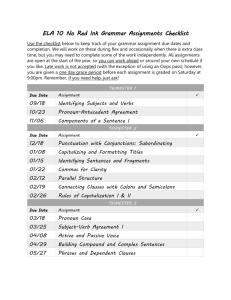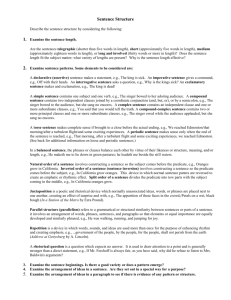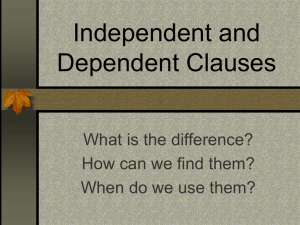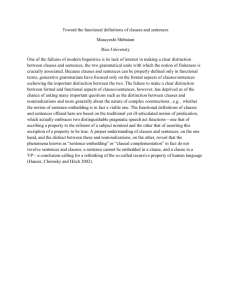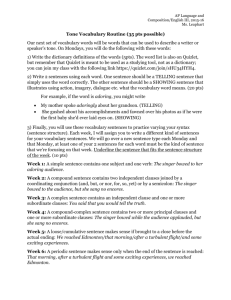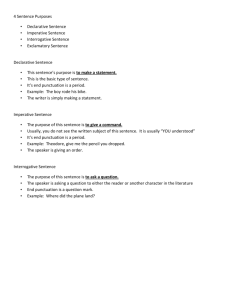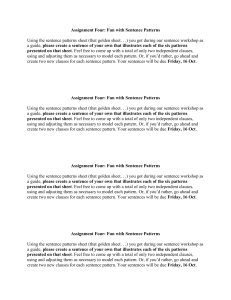Course: English Writing
advertisement
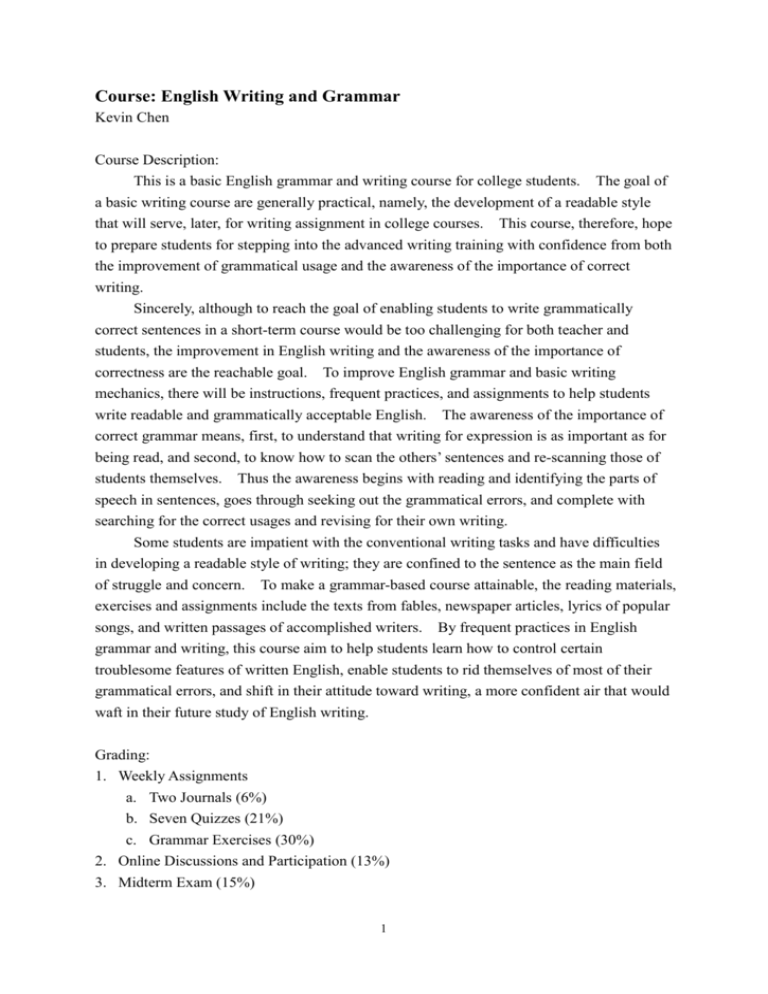
Course: English Writing and Grammar Kevin Chen Course Description: This is a basic English grammar and writing course for college students. The goal of a basic writing course are generally practical, namely, the development of a readable style that will serve, later, for writing assignment in college courses. This course, therefore, hope to prepare students for stepping into the advanced writing training with confidence from both the improvement of grammatical usage and the awareness of the importance of correct writing. Sincerely, although to reach the goal of enabling students to write grammatically correct sentences in a short-term course would be too challenging for both teacher and students, the improvement in English writing and the awareness of the importance of correctness are the reachable goal. To improve English grammar and basic writing mechanics, there will be instructions, frequent practices, and assignments to help students write readable and grammatically acceptable English. The awareness of the importance of correct grammar means, first, to understand that writing for expression is as important as for being read, and second, to know how to scan the others’ sentences and re-scanning those of students themselves. Thus the awareness begins with reading and identifying the parts of speech in sentences, goes through seeking out the grammatical errors, and complete with searching for the correct usages and revising for their own writing. Some students are impatient with the conventional writing tasks and have difficulties in developing a readable style of writing; they are confined to the sentence as the main field of struggle and concern. To make a grammar-based course attainable, the reading materials, exercises and assignments include the texts from fables, newspaper articles, lyrics of popular songs, and written passages of accomplished writers. By frequent practices in English grammar and writing, this course aim to help students learn how to control certain troublesome features of written English, enable students to rid themselves of most of their grammatical errors, and shift in their attitude toward writing, a more confident air that would waft in their future study of English writing. Grading: 1. Weekly Assignments a. Two Journals (6%) b. Seven Quizzes (21%) c. Grammar Exercises (30%) 2. Online Discussions and Participation (13%) 3. Midterm Exam (15%) 1 4. Final Exam (15%) Tentative Working Syllabus Focus Week Quiz & Assignment Reading & Sentence Analysis 1 Introduction to the Course Unit 1 Comprehension to the Writing Video(Part 1) 2 Unit 2: <What is a sentence?> 1. Quiz 1: Questions for the Aesop's Fables – 2-1. The parts of speech (word form) Writing Video “The Miller, His 2-2. Simple, Compound, and Complex Sentences 2. Journal 1: Free-writing Trial Son, and Their Ass” 3 2-3. Recognizing subjects and verbs a. Common Errors: Sentence Fragment 1. Exercise: Analysis of newspaper F. Scott headlines to distinguish sentences Fitzgerald – from non-sentences “People Act” 2. Exercise: Common Errors: Fragment 4 Unit 3: <Clauses> 1. Quiz 2: Common Errors: 1. Independent Clauses comma splice a. The comma splice and run-together sentence 3. Exercise: Identifying Dependent Clauses 2. Dependent Clauses 5 a. Types of dependent clauses b. Punctuation of clauses Unit 4:<Agreement and Pronoun Reference 1. Exercise: Analysis of deliberate “A ‘Poor Aunt’ fragments by accomplished Story(Part)” > 1. Agreement of subject and verb 2. Agreement of pronoun and antecedent 6 writers 2. Exercise: Common Errors: Two 3. Reference of pronouns Unit 5:<Tense, Voice, Mood> 1. a. b. 2. Verbs 1. Quiz 3: Common Errors: Tense Three principal parts of a verb Using past perfect tense (“had”) Tense and mood Agreement 2. Exercise: Common Errors: The Subjunctive Mood 2 “If” by Bread 7 3. Active and passive voice Unit 6 <Ranking Sentences in Order> 1. Quiz 4: Common Errors: The Past Perfect Tense Comprehension to the Writing Video(Part 2) 2. Exercise: Picking up the unsupportive sentences 8 “Brown Sugar” by Unit 7:<Contracting long sentences> 1. Exercise: Narrative sentences 1. Verbals from short stories The Rolling a. Gerunds b. Participles 2. Practice: Avoiding split Stones infinitives c. Infinitives 2. Position a. Single-word adjectives b. Appositional forms 2. Suffixes signifying attachment a. –ing b. –ed 9 10 Midterm Exam “The Birth, Rise, Unit 8:<Practicing basic types of embedding 1. Exercise: Noun clauses 2. Exercise: Relative clauses (who, and Fall of I> 8-1. Noun clauses which, that) as adjectives Township” (I) 8-2. Relative clauses (who, which, that) as adjectives 11 Junitaki Unit 9:<Practicing basic types of embedding 1. Quiz 5: Noun Clauses, Adverbial clauses, and Adjective II> “The Birth, Rise, 9-1. Adverbial clauses (when, if , because) 9-2. Appositions 9-3. Participial phrases (-ing, -ed) Township” (II) Clauses and Fall of Junitaki 2. Exercise: Adverbial clauses (when, if , because) 3. Exercise: Appositions & Participial phrases 12 Unit 10 Topic Sentences and Concluding Sentences 1. Quiz 6: Participial phrases 2. Exercise: Looking for the Topic Sentence Comprehension to the Writing Video(Part 3) 3. Exercise: Writing the Concluding Sentence 13 Unit 11 Summary and Paraphrase 3 1. Exercise: Summary “Blowin’ In The 2. Exercise: Paraphrase Wind” by Bob 3. Exercise: Inversions 14 Dylan Unit 12:<Linking Sentences> 1. Exercise: Coordinating sentence “Castro Revisits 12-1. Coordinating sentence with and, but , for, or, and so 12-2. The semicolon and colon elements with and, but , for, or, Harlem” and so 3. Exercise: The semicolon and colon 15 16 Unit 13:<Consolidations> 1. Quiz 7: Coordination Sherlock 13-1 Coordinate Consolidations 13-2 Subordinate Consolidations 13-3 Avoiding Redundant Fillers 2. Exercise: Avoiding Empty Holmes-“The Fillers Science of Unit 14 <Thesis Statement> 1. Exercise: Evaluating the Thesis Deduction” Comprehension to the Writing Video(Part 4) Statement 17 Unit 15:<Quoting> 1. Exercise: Looking for the The Little Wrong Quoting Prince(Chapter 21) 2. Journal 2 18 Final Exam 4
